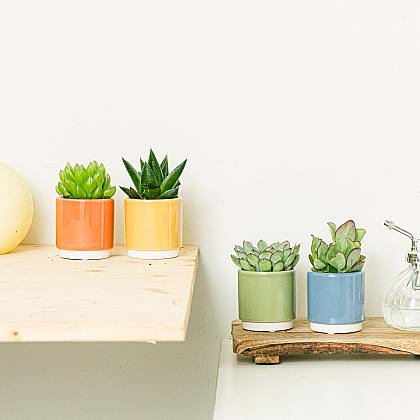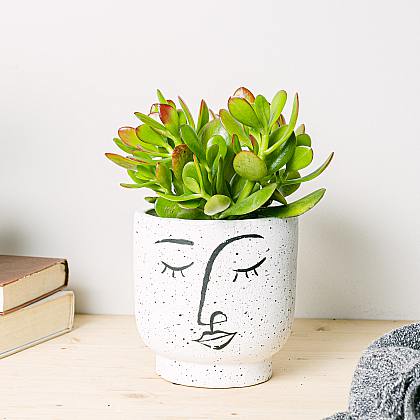A practical guide to selecting the right houseplant based on the size of your home and the specific needs of your customers
If you're a plant lover and have pets at home, choosing the perfect houseplant can be a challenge. It's important to understand your animals' needs before selecting a plant, as some can be toxic to them
If you're a plant lover and have pets at home, choosing the perfect houseplant can be a challenge. It's important to understand your animals' needs before selecting a plant, as some can be toxic to them. Also, if you live in a small apartment or a large house, you need to consider the size and amount of sunlight your home receives. In this comprehensive guide, we'll help you choose the best option for you and your pets. We present you with a variety of houseplants suitable for different spaces and needs, from purifying the air to being easy to care for. We'll also give you tips to keep your plants healthy and happy. Read on to find the perfect houseplant for your home!
Understanding Your Pets' Needs
Understanding your pet's needs is critical when choosing the perfect houseplant for your home. Some pets, such as cats and dogs, can be curious and playful, which means they might try to bite or chew on plants. In this case, it is important to avoid toxic plants that can cause them harm. On the other hand, some pets may have allergies or sensitivities to certain plants, so it is necessary to research and choose plants that do not trigger any adverse reactions in them. In addition, the size and activity of your pets should also be taken into account. If you have large, energetic pets, they may want to play around plants, so it's important to choose hardy plants that can withstand a bit of abuse. On the other hand, if you have small, delicate pets, you may want to avoid plants with spiky or hanging leaves that can prove dangerous if bitten or ingested. Understanding your pets' needs and behaviors will help you select the right houseplant for your home, thus ensuring the safety and well-being of both your pets and your plants.
Houseplants for small apartments
If you live in a small apartment and are looking for houseplants that will suit your space, there are several options available. Hanging plants are ideal for small apartments, as they take up little floor space and can be placed in hanging pots or on high shelves. Some popular options include English ivy, spider plant, and money plant. Not only do these plants add a touch of green to your home, but they also help purify the air and create a healthier environment. Another option for small apartments is succulents. These plants are known for their ability to store water in their leaves and stems, which means they require little water and care. Succulents come in a wide variety of shapes and colors, making them a versatile choice for decorating your apartment. Some popular succulents include the Christmas cactus, jade plant, and echeveria. Remember that regardless of the size of your apartment, it's important to consider how much natural light your plants receive. If your apartment has low light, opt for houseplants that tolerate low-light conditions, such as Boston fern or pothos.
Houseplants for Large Homes
Large homes have great potential to look stunning with houseplants. If you have a lot of space, you can opt for larger plants that fill empty areas and add color and texture. A popular choice is ficus trees, which can grow to the ceiling and have glossy, green leaves. You can also opt for palm trees, such as the Kentia or the Areca, which add a tropical and elegant touch to the home. If you prefer flowering plants, orchids are a great option to add a sophisticated touch to any room.
Another option for large homes is hanging plants, which look spectacular in tall and spacious spaces. Vines, such as ivy or pothos, are ideal for this purpose. These plants are also great for covering walls or empty walls.
It's important to consider the natural light available in each room before choosing the right houseplants. In large homes, there are likely to be spaces with different levels of light, so you'll need to select plants that suit each environment. For example, tropical plants such as Monstera deliciosa or Calathea need indirect light, while others such as cacti or succulents require a lot of direct light.
In conclusion, large houses offer many interesting options for decorating with indoor plants. By choosing the right ones according to the space available and the amount of natural light, you can transform your home into a green oasis that in addition to being beautiful, contributes to improving air quality.
Houseplants that purify the air
Not only are houseplants a beautiful decoration for your home, but they can also have a positive effect on air quality. Some plants are known for their air-purifying properties, which means they can absorb harmful chemicals and toxic gases from the air. These plants can be especially beneficial if you live in a city with high levels of pollution or if you have allergies. Some of the best houseplants for purifying the air include bamboo palm, English ivy, peace lily, aloe vera, and spider plant. Bamboo palm is particularly good at absorbing formaldehyde, a common chemical in many household products. English ivy is excellent at absorbing benzene, a chemical found in many plastics and synthetics. Peace lily is known for its ability to remove mold from the air, while Aloe Vera can help fight volatile organic compounds (VOCs) released by cleaning products. Finally, the spider plant is ideal for absorbing substances such as carbon monoxide and carbon dioxide from the air. If you're looking for an easy and natural way to improve the air quality in your home, consider adding some of these plants to your indoor collection.
The Easiest Houseplants to Care
forThe easiest houseplants to care for are ideal for those who don't have a lot of gardening time or experience. These plants require minimal care and adapt well to different environmental conditions. One of the most popular choices is cacti, as they are hardy and require little water. Another easy-to-care plant is the succulent, which stores water in its leaves and can survive for extended periods without watering. Plants in the fern family are also an excellent choice, as they prefer humid environments and don't need a lot of direct sunlight. In addition, plants in the palm family, such as the bamboo palm or areca palm, are very hardy and only need occasional watering. Lastly, the snake plant (Sansevieria) is another popular choice due to its tolerance to low-light conditions and its ability to purify the air. These plants are perfect for those looking to add a touch of green to their home without having to worry too much about their care.
How to Avoid Toxic Plants for Your Pets
How to Avoid Toxic Plants for Your Pets
When it comes to choosing houseplants for your home, it's important to consider the safety of your pets. Some plants can be toxic to animals and cause health problems if ingested. To avoid any risk, it is advisable to find out about plants that can be dangerous and keep them out of the reach of your pets.
Some common plants that you should avoid having at home if you have pets include lily, aloe vera, English ivy, and money plant. These plants can cause anything from skin irritation to serious digestive problems if consumed by animals. It's important to remember that even a small amount of these plants can be harmful.
To make sure that all the plants in your home are safe for your pets, it's a good idea to do your research before buying a new plant. You can consult with a gardening expert or look up information online about which plants are toxic to animals. Additionally, you can choose to place the plants on high shelves or hang them from the ceiling to prevent your pets from reaching them.
If you suspect your pet has ingested a toxic plant, it's important to act quickly and contact your veterinarian immediately. They will be able to provide you with instructions on how to proceed and what steps to take to ensure your pet's health and safety.
Remember, prevention is better than cure. By taking precautions and avoiding having toxic plants in your home, you can ensure that both you and your beloved pets can enjoy a safe and healthy environment.
Tips to Keep Your Plants Healthy and Happy
To keep your plants healthy and happy, it's important to follow a few simple tips. First of all, make sure to water your plants regularly, but don't overdo it. Too much water can drown the plant's roots, while too little water can cause them to dry out. The amount of water needed depends on the type of plant and the climate you live in, so it's important to research the specific needs of each plant. Additionally, it's important to provide your plants with the right amount of sunlight. Make sure the plants get enough light to grow, but not enough to burn. Another way to keep your plants healthy is to provide them with the right nutrients. You can use natural or commercial fertilizers to make sure your plants have all the nutrients they need to grow strong and healthy. It is also important to maintain good drainage in the pots to prevent root rot. Finally, pay attention to the leaves of your plants. If you notice any changes in its color or texture, it may be a sign that something isn't right. With these simple tips, you'll be able to keep your plants healthy and happy for a long time.
In this comprehensive guide to choosing the perfect houseplant for your home and pets, we've explored different aspects to consider when selecting the right plants. We have understood the needs of our pets and how to avoid plants that are toxic to them. We've also discovered which plants are ideal for small apartments and large homes, as well as those that purify the air and are easy to care for. In addition, we have provided tips for keeping our plants healthy and happy. Now, it's time to put all this information into practice and find the perfect houseplant that suits our needs and lifestyle. What type of plant do you think would be ideal for your home? Do you dare to give a touch of green to your space?


